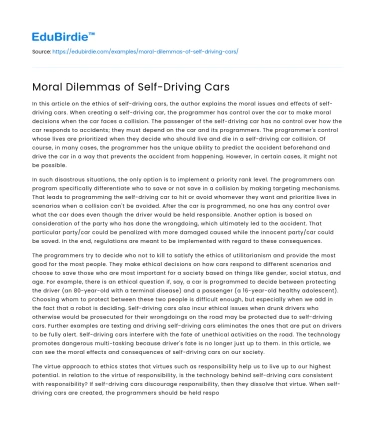Introduction
The advent of self-driving cars represents a technological revolution with the potential to transform transportation systems globally. As these autonomous vehicles become more prevalent, they bring forth not only novel opportunities but also complex moral dilemmas. Self-driving cars must navigate environments where split-second ethical decisions are crucial. The integration of artificial intelligence into decision-making processes raises questions about responsibility, ethics, and societal norms. The moral dilemmas associated with autonomous vehicles are emerging as critical considerations for manufacturers, policymakers, and the public. The ability of these vehicles to make ethical decisions during unavoidable accidents is a primary concern. The pivotal ethical quandary involves determining how an autonomous vehicle should prioritize the lives of passengers, pedestrians, and other road users when faced with potential collisions. This essay explores these ethical challenges, examines real-life cases, and discusses the implications of resolving such dilemmas.
Programming Ethics into Autonomous Vehicles
One central ethical issue of self-driving cars is the programming of decision-making algorithms responsible for life-and-death choices. These algorithms must decide the best course of action in critical situations, often based on utilitarian principles that aim to minimize harm. For instance, the "Trolley Problem" is a well-known ethical thought experiment applied to autonomous vehicles. It questions whether a car should swerve to avoid hitting several pedestrians at the expense of the life of a single pedestrian or the passengers inside. According to Lin (2016), "The decision-making process of self-driving cars must balance competing ethical principles and the societal value placed on human life." This challenge is further complicated by the diversity of ethical frameworks that could be applied, such as deontological ethics, which would emphasize adherence to rules over outcomes.
Save your time!
We can take care of your essay
- Proper editing and formatting
- Free revision, title page, and bibliography
- Flexible prices and money-back guarantee
Real-life cases already illustrate these dilemmas. In 2018, a self-driving Uber vehicle struck and killed a pedestrian in Arizona. This incident raised critical questions about the ethical responsibility of the vehicle's programming and the oversight of such technology. As Goodall (2014) highlights, "The ethical algorithms must be transparent and subject to public scrutiny to gain societal trust." The need for a standardized ethical framework becomes evident, yet achieving consensus on such standards is fraught with difficulty due to cultural and individual differences in ethical perspectives.
Liability and Accountability in Self-Driving Cars
Another significant moral dilemma involves liability and accountability when accidents occur involving autonomous vehicles. Traditionally, human drivers are held accountable for their actions on the road. However, when control is transferred to a machine, questions arise regarding who should be liable for any harm caused. Manufacturers, software developers, and even policymakers could potentially share responsibility. The legal system must evolve to address these new challenges, which may include revising existing laws or creating entirely new regulatory frameworks.
For instance, the European Union's General Data Protection Regulation (GDPR) addresses some aspects of data privacy and accountability, but it does not directly tackle the intricacies of liability in autonomous vehicle accidents. As Hevelke and Nida-Rümelin (2015) argue, "Assigning liability in accidents involving self-driving cars requires a novel approach that considers the unique interactions between human and machine." This complexity is evident in insurance implications, where determining fault can be challenging. The implementation of black box systems in autonomous vehicles, akin to those in aircraft, may provide data to assist in these determinations. However, reliance on such systems raises concerns about surveillance and privacy.
Public Perception and Ethical Acceptance
Public perception plays a crucial role in the adoption and ethical acceptance of self-driving cars. Trust in technology and the ethical frameworks guiding it will determine the extent to which society embraces autonomous vehicles. Public opinion is shaped by media coverage, high-profile incidents, and the perceived safety of self-driving technology. According to a survey by Schoettle and Sivak (2014), "Public acceptance of autonomous vehicles is contingent upon their perceived ethical behavior and safety record." Therefore, transparency in the decision-making algorithms and the ethical principles guiding them is essential.
Counterarguments suggest that public apprehension may stem from a lack of understanding of the technology. Educating the public about the safety advantages and ethical considerations of self-driving cars could mitigate some concerns. Furthermore, as autonomous vehicles demonstrate improved safety records over time, societal trust may increase. However, it remains crucial to address ethical concerns proactively to prevent public backlash and ensure the successful integration of this transformative technology.
Conclusion
The ethical challenges posed by self-driving cars are multifaceted and demand careful consideration from developers, policymakers, and society at large. Balancing safety, ethical principles, and public acceptance is no small feat. The programming of ethical algorithms, liability distribution, and public trust are key issues that require thoughtful solutions. As the technology continues to evolve, the need for a standardized ethical framework becomes increasingly apparent. By addressing these moral dilemmas through collaborative efforts, society can harness the potential of autonomous vehicles while ensuring ethical integrity and public confidence. Ultimately, the success of self-driving cars will depend on their ability to navigate both the physical roads and the moral landscapes they encounter.






 Stuck on your essay?
Stuck on your essay?

